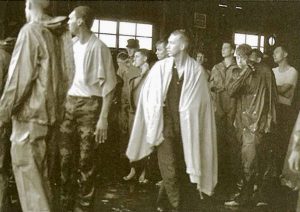The Fuji Fire is considered by many to be one of the most serious peacetime disasters suffered by our United States Marine Corps. Among the 54 Marines badly burned, thirteen Marines lost their lives. Yet, many people have never heard of it. Marine Corps Veteran Chas Henry has written a book to try and remedy that situation. It is called “Fuji Fire; Sifting Ashes of a Forgotten U.S. Marine Corps Tragedy”.
Chas is a combat decorated Marine Corps Veteran himself and rose from Private to Captain during his career with the Corps. He is also a highly recognized and award-winning television and radio journalist.
On October 19, 1979, Typhoon Tip, the largest and most intense tropical cyclone ever recorded, raged with 155 mile an hour winds and torrential rain. The 1,250 Marines at Camp Fuji hunkered down in their Quonset huts to ride the storm out.
Just above them on the hill sat a fuel farm – three rubber bladders held in place by a retaining wall. Rain from the typhoon eroded the retaining wall, causing one of bladders to break free and subsequently torn open by a piece of equipment. Soon 5,500 gallons of fuel mixed with the water flooding down on Camp Fuji, where many of the Quonset huts were warmed by open-flame heaters. Soon the Marines at Camp Fuji found themselves engulfed by literal rivers of fire.
Chas shares what his four-year, two continent investigations revealed about how this “perfect storm” situation came to be. We also discuss some of the amazing stories of heroism and resilience demonstrated by both our military and the Japanese citizens who rushed to help extinguish the fire and treat the burn victims.
An investigation concluded that “No person or persons, is responsible for the fire that occurred at Camp Fuji on 19 October 1979; it was an act of God.”

